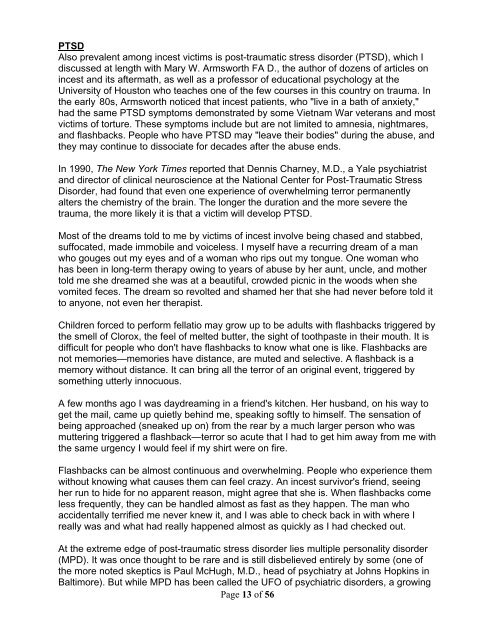Do you want to know what incest is? What it really is? No ...
Do you want to know what incest is? What it really is? No ...
Do you want to know what incest is? What it really is? No ...
Create successful ePaper yourself
Turn your PDF publications into a flip-book with our unique Google optimized e-Paper software.
PTSD<br />
Also prevalent among <strong>incest</strong> victims <strong>is</strong> post-traumatic stress d<strong>is</strong>order (PTSD), which I<br />
d<strong>is</strong>cussed at length w<strong>it</strong>h Mary W. Armsworth FA D., the author of dozens of articles on<br />
<strong>incest</strong> and <strong>it</strong>s aftermath, as well as a professor of educational psychology at the<br />
Univers<strong>it</strong>y of Hous<strong>to</strong>n who teaches one of the few courses in th<strong>is</strong> country on trauma. In<br />
the early ' 80s, Armsworth noticed that <strong>incest</strong> patients, who "live in a bath of anxiety,"<br />
had the same PTSD symp<strong>to</strong>ms demonstrated by some Vietnam War veterans and most<br />
victims of <strong>to</strong>rture. These symp<strong>to</strong>ms include but are not lim<strong>it</strong>ed <strong>to</strong> amnesia, nightmares,<br />
and flashbacks. People who have PTSD may "leave their bodies" during the abuse, and<br />
they may continue <strong>to</strong> d<strong>is</strong>sociate for decades after the abuse ends.<br />
In 1990, The New York Times reported that Denn<strong>is</strong> Charney, M.D., a Yale psychiatr<strong>is</strong>t<br />
and direc<strong>to</strong>r of clinical neuroscience at the National Center for Post-Traumatic Stress<br />
D<strong>is</strong>order, had found that even one experience of overwhelming terror permanently<br />
alters the chem<strong>is</strong>try of the brain. The longer the duration and the more severe the<br />
trauma, the more likely <strong>it</strong> <strong>is</strong> that a victim will develop PTSD.<br />
Most of the dreams <strong>to</strong>ld <strong>to</strong> me by victims of <strong>incest</strong> involve being chased and stabbed,<br />
suffocated, made immobile and voiceless. I myself have a recurring dream of a man<br />
who gouges out my eyes and of a woman who rips out my <strong>to</strong>ngue. One woman who<br />
has been in long-term therapy owing <strong>to</strong> years of abuse by her aunt, uncle, and mother<br />
<strong>to</strong>ld me she dreamed she was at a beautiful, crowded picnic in the woods when she<br />
vom<strong>it</strong>ed feces. The dream so revolted and shamed her that she had never before <strong>to</strong>ld <strong>it</strong><br />
<strong>to</strong> anyone, not even her therap<strong>is</strong>t.<br />
Children forced <strong>to</strong> perform fellatio may grow up <strong>to</strong> be adults w<strong>it</strong>h flashbacks triggered by<br />
the smell of Clorox, the feel of melted butter, the sight of <strong>to</strong>othpaste in their mouth. It <strong>is</strong><br />
difficult for people who don't have flashbacks <strong>to</strong> <strong>know</strong> <strong>what</strong> one <strong>is</strong> like. Flashbacks are<br />
not memories—memories have d<strong>is</strong>tance, are muted and selective. A flashback <strong>is</strong> a<br />
memory w<strong>it</strong>hout d<strong>is</strong>tance. It can bring all the terror of an original event, triggered by<br />
something utterly innocuous.<br />
A few months ago I was daydreaming in a friend's k<strong>it</strong>chen. Her husband, on h<strong>is</strong> way <strong>to</strong><br />
get the mail, came up quietly behind me, speaking softly <strong>to</strong> himself. The sensation of<br />
being approached (sneaked up on) from the rear by a much larger person who was<br />
muttering triggered a flashback—terror so acute that I had <strong>to</strong> get him away from me w<strong>it</strong>h<br />
the same urgency I would feel if my shirt were on fire.<br />
Flashbacks can be almost continuous and overwhelming. People who experience them<br />
w<strong>it</strong>hout <strong>know</strong>ing <strong>what</strong> causes them can feel crazy. An <strong>incest</strong> survivor's friend, seeing<br />
her run <strong>to</strong> hide for no apparent reason, might agree that she <strong>is</strong>. When flashbacks come<br />
less frequently, they can be handled almost as fast as they happen. The man who<br />
accidentally terrified me never knew <strong>it</strong>, and I was able <strong>to</strong> check back in w<strong>it</strong>h where I<br />
<strong>really</strong> was and <strong>what</strong> had <strong>really</strong> happened almost as quickly as I had checked out.<br />
At the extreme edge of post-traumatic stress d<strong>is</strong>order lies multiple personal<strong>it</strong>y d<strong>is</strong>order<br />
(MPD). It was once thought <strong>to</strong> be rare and <strong>is</strong> still d<strong>is</strong>believed entirely by some (one of<br />
the more noted skeptics <strong>is</strong> Paul McHugh, M.D., head of psychiatry at Johns Hopkins in<br />
Baltimore). But while MPD has been called the UFO of psychiatric d<strong>is</strong>orders, a growing<br />
Page 13 of 56


